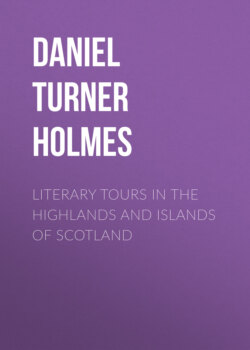Читать книгу Literary Tours in The Highlands and Islands of Scotland - Daniel Turner Holmes - Страница 7
На сайте Литреса книга снята с продажи.
DIFFICULTIES OF TRAVEL.
ОглавлениеTable of Contents
It can very easily be seen that he who proposed to visit all the above districts would have some hard and continuous work in prospect. Even on the mainland of Scotland there are many villages of difficult access. The nearest railway station to Durness on Loch Eriboll is Lairg, sixty miles away. Gairloch in Ross-shire is thirty miles distant from the railway station of Achnasheen. In the great county of Aberdeen there are a good many villages that can only be reached by long and tiresome driving in a mail coach. At different parts of the Moray Firth little townships lie huddled at the foot of precipitous cliffs, and, at first sight, seem inaccessible except by sea. To one accustomed to the sumptuous equipment of the Clyde steamers, even the journey to the shrine of Hugh Miller at Cromarty is pleasant only in good weather: a wee, puffing, hard-wrought steam-launch takes a slant course of five miles from Invergordon to Cromarty pier, accomplishing the journey in forty-five minutes. The fare between the two piers is one shilling, and there is no extra charge for the use of the cabin, which is reached by a perpendicular and very slippery ladder, and would be better suited for philosophical reflection in a gale if the crew did not use it as a store-room for engine-grease and old oilskins. In the Outer Islands, Watt's machine is, of course, unknown, and many of the roads which imaginative cartographers have inserted in their maps, will perhaps be finished when the last trump is about to sound.
Railway travelling, too, is attended with some inconveniences in winter. The Glasgow-Inverness train, for example, may, on the coldest night of the year, break down at Dalnaspidal; and in such a case the passengers will have to sit, entertained by howling blasts, till a fresh engine comes up from Blair Atholl. Such an experience was once mine, and I always think of it when I read the ninth ode of Horace's first book. Outside were the great snow-sheeted mountains, and the moon was gazing in blear-eyed compassion through a screen of haze. From end to end of the train resounded the rhythmic beat of cold-footed passengers striving to bring some warmth of blood to the toes.
In Grantown-on-Spey, I got an uncommon surprise one February. There had been some snow in the Lowlands, but at Grantown the fall had been excessive, and the roads were encumbered. On arriving at the station, the travellers saw a sleigh waiting to convey them to the hotel. The conveyance suited the weather admirably, and the horses seemed to be enjoying the fun. No wheeled vehicles were to be seen: even the milkmen sleighed their commodity from door to door. "If we had a brace of grand-dukes and a bomb or two, we could fancy ourselves in Russia," said the facetious hotel-porter. He asserted that it was well for the country when abundant snow came down early in the year. It seems that Grantown is apt to suffer from drought in a hot summer following on a rainless spring. A copious fall of snow early in the year is retained in the mountains, and ensures plenty of moisture during the months of heat. Moisture is needed in summer, for the population is trebled then, and most tourists require a little water, sometimes, to qualify their potations.
It is evident from what I have said, that the pedantic and vexatious system adopted by Euclid in his Elements of Geometry could not be employed in arranging the chapters of this book. The stern consecutiveness of that immortal but unpopular author would be out of place in describing journeys which might have been taken in the reverse order without much difference in the results.
